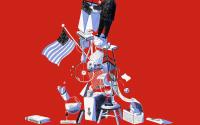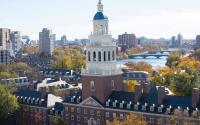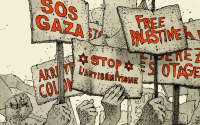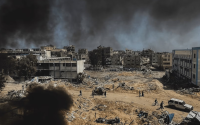 Initial results from the election are expected within hours |
The parliamentary poll was delayed after the killing of opposition leader Benazir Bhutto, and is intended to complete a transition to civilian rule.
Polling stations officially closed at 1700 (1200 GMT), and initial results are expected within hours.
BBC correspondents reported many irregularities in voting, and some incidents of violence.
However, there were none of the major bomb attacks which overshadowed the run-up to the elections.
Nine killed
But fears of violence dissuaded many of the country's 80 million eligible voters from leaving their homes, and voting in many places was slow.
At least nine people are reported to have been killed in election related violence on the eve of the vote and on the day itself.
In one incident in Daska district in the Punjab, a polling agent from one party reportedly shot dead an agent from a rival party after a dispute.
In another, on Sunday, at least four people, including a candidate, were reported to have been killed after an attack on former Prime Minister Nawaz Sharif's PML-N party.
BBC journalists also reported a number of voting irregularities across the country: BBC correspondent Riaz Sohail was shot at as he approached a polling station in Natario village, Sindh province, to investigate reports of ballot stuffing. Pakistan People's Party (PPP) activists and voters were also fired upon
In Karachi, protesters from Awami National Party (ANP) blocked roads and stoned vehicles after an attack on their candidate Firing on a polling station in Gujranwala in the Punjab caused voting to be suspended The presiding officer of a polling station in east Karachi - a PPP stronghold - said his police escort took him to the wrong location, leaving him 5km (three miles) from the station, meaning polling was delayed by five hoursNawaz Sharif, after casting his ballot in the eastern city of Lahore, accused the PML-Q party that backs President Musharraf of "committing rigging, and... attacking our candidates and supporters", AFP news agency reported.
The leader of Ms Bhutto's PPP party, her widower Asif Ali Zardari, has threatened to launch street protests in the event of vote-rigging.
 Most counts will be completed by Tuesday morning |
President Musharraf, voting in Rawalpindi, vowed to work in "harmony" with whoever won the polls, his spokesman said.
There are many local election observers on the ground, but few international observers, who have either not been invited or complained they could not work freely.
One, US Senator Joseph Biden, said he feared instability if the vote was rigged.
"If the majority of Pakistani people do not think the election was fair then I think we have a real problem," he said.
Security tight
Close to half a million security personnel, including about 80,000 soldiers, have been deployed for the voting.
The BBC's Barbara Plett, outside a polling station in Lahore, described a barrier designed to prevent car bombs and a heavy police presence.
She said men and women were in separate queues for voting.
In one tribal area near Peshawar, she said, elders had banned women from voting.
In certain areas the fear of violence hung heavy.
In the town of Charsadda, in volatile North West Frontier Province, election official Shah Zeb told the AP news agency: "We're all afraid but what can we do? I left my home today, and I prayed to God to bring me back safely. Now it is in the hands of God."
Local police told the BBC that nine election security officers had gone missing, feared kidnapped, near the town of Bannu, in North West Frontier Province.
Prospects
Analysts say polls suggest a fair vote is likely to result in a hung parliament, with none of the three biggest parties winning a majority.
Attention will then turn on the PPP, and whether it chooses to join forces with pro-Musharraf parties, or with Mr Sharif's party.
Mr Sharif is staunchly opposed to the president, and if the two opposition parties jointly gain two-thirds of the seats, they may try to impeach him, correspondents say.
Mr Musharraf stepped down as army chief late last year. He has ruled the country since seizing power in a coup in 1999.






